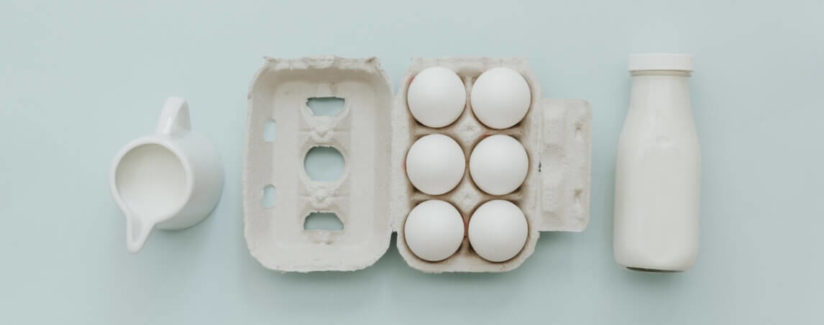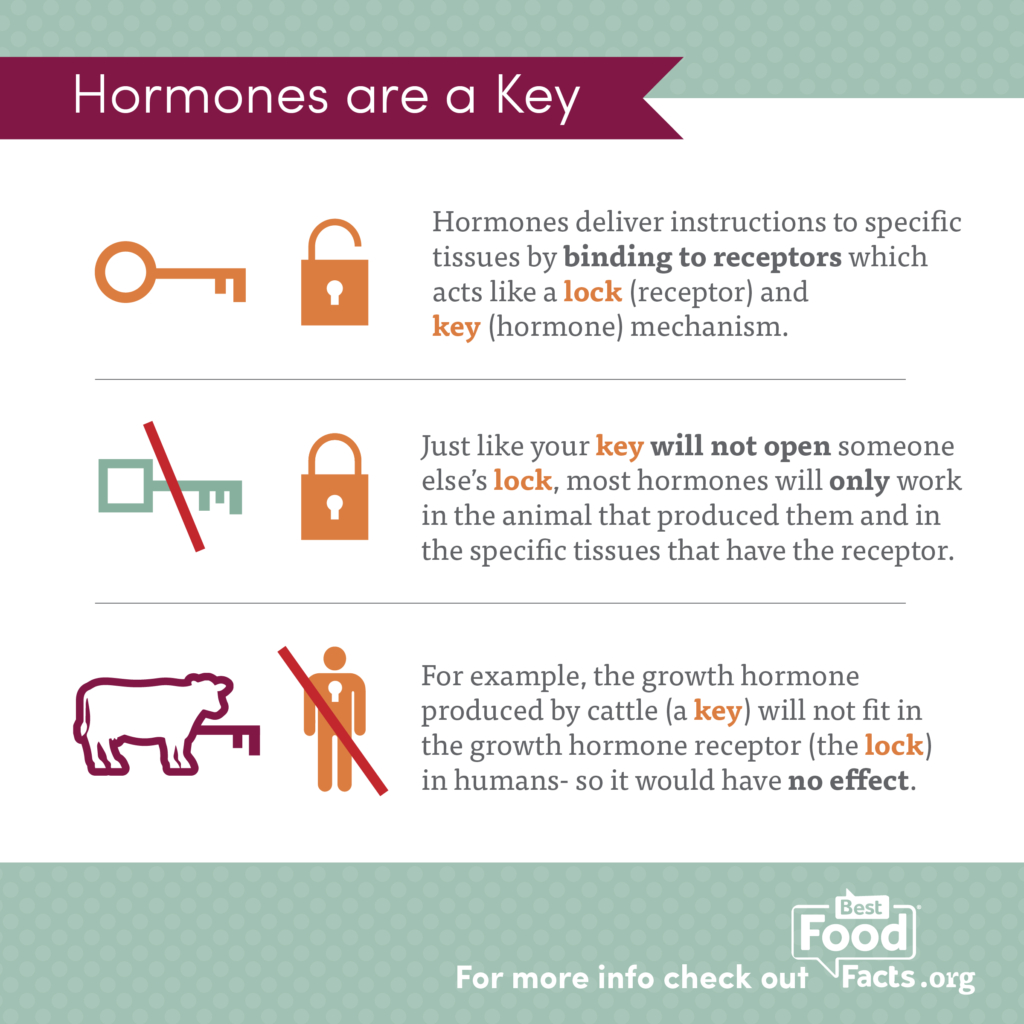
Are There Hormones in My Food? Part 1
10/03/2018
Does the food we eat contain hormones? Are added hormones different than natural ones? At Best Food Facts, we have looked into questions about hormones in meat, milk and eggs.
We wanted to dig a little deeper to find out how hormones work and why some hormones in food could affect humans while others could not. We have developed a three-part series about hormones naturally found in plants and animals and those used as supplements in animal production and whether or not there are any health concerns.
We reached out to Dr. Troy Ott, a professor of reproductive physiology, and Dr. Tara Felix, a beef extension specialist, both at Pennsylvania State University, to explain the basics of hormones.
What is a hormone?
Dr. Ott and Dr. Felix: “Hormones are small chemicals that are produced by and circulate throughout the bodies of all living things.”
What is a hormone’s function in the body?
Dr. Ott and Dr. Felix: “Hormones give instructions to cells and tissues on how to adjust what they are doing to help grow, reproduce and thrive. You may remember your first recognition of the effects of hormones when you went through puberty-that was a blast, wasn’t it! Without hormones, life as we know it could not exist.”
How do hormones work?
Dr. Ott and Dr. Felix: “Specific hormones have specific jobs. For example, when a female has a baby the hormone prolactin is produced that circulates through her blood to the mammary gland and instructs the cells to produce milk. That hormone does not cause other cells in the body to produce milk, just the mammary gland. This specificity is what is so great about hormones. Hormones deliver instructions to specific tissues by binding to receptors which acts like a lock (receptor) and key (hormone) mechanism. Just like your key will not open someone else’s lock, most hormones will only work in the animal that produced them and in the specific tissues that have the receptor. For example, the growth hormone protein produced by cattle (a key) will not fit in the growth hormone receptor (the lock) in humans- so it would have no effect.”
If hormones are in all living things, what happens to the hormones in my food once I eat it?
Dr. Ott and Dr. Felix: “Many hormones are rapidly digested when consumed (because they are just proteins), so even if they could open your locks, they are digested in your gut. Some hormones (mainly steroid hormones) are similar enough between species that at the right concentrations, they could affect our locks. Steroid hormones are not proteins and could get across your gut and enter your body. All animal food products, and plant products for that matter, contain small amounts of natural steroid hormones, but the amounts are very low and not a concern. In some cases, natural or synthetic steroid hormones are supplemented to improve growth efficiency. However, even in cases when animals are supplemented with these steroid hormones the concentrations are far below levels that could have an effect on the consumer. In fact, the levels of these hormones in the food produced from these animals are still hundreds of times less than what you might get from eating say broccoli or cabbage. Because, remember, life requires hormones. All living things, plants and animals, contain hormones. So, if someone tries to sell you ‘hormone-free’ animal products, you know they are not being honest.”
What is the difference between “added” and “natural” hormones?
Dr. Ott and Dr. Felix: “’Natural’ hormones are typically thought of as hormones that are produced by the animal and circulate in the animal’s body. Added hormones are just that, they are added to the animal to help improve some aspect of production. For example, growth hormone can be ‘added’ or given to cows to make them produce milk more efficiently. The added growth hormone is essentially identical to the natural hormone. So, from the cow’s perspective, the response is the same and milk production increases. As an analogy, many people consume the chemical caffeine in various natural or manufactured beverages to improve their mental acuity. Caffeine acts as a hormone in your body and makes you more alert. Now, added hormones can be similar or identical to natural hormones. This means it has the identical structure and activity of the natural hormone. An example of this would be prostaglandin F, a natural hormone that regulates an animal’s reproductive cycle. It can be added to allow farmers to better regulate when their animals get pregnant.”
How does our body react to these “added” or “natural” hormones?
Dr. Ott and Dr. Felix: “Thankfully, our digestive system is designed to encounter many chemicals in the environment and our liver intercepts and degrades or expels natural, synthetic or added hormones from animal (or plant) products. Everything in the natural world is made from chemicals and some natural chemicals can be more toxic than synthetic chemicals. Botulinum toxin is natural and one of the most toxic substances known, however, medical doctors use small amounts to treat migraines and remove wrinkles in your face.”
I have seen food products labeled “hormone-free.” Are these labels accurate?
Dr. Ott and Dr. Felix: “Remember, all animal products contain low levels of natural hormones – again, there are no hormone-free animal products. For example, the same size steak would contain nearly 3 times more estrogenic activity if it came from a female animal compared to a male animal…just because the animal was female!
“Also remember that all things that were once living contain hormones, so you consume hormones when you eat plant products, as well. For perspective, if you set the amount of estrogenic activity in a 3 oz steak equal to one M&M candy, then 3 oz of tofu (made from soy plants) would contain a tractor-trailer full of M&M – that’s 19 million times more. Big difference! But fear not, eat your tofu because your liver is there to deal with any substances that enter your body from the food you eat.”
Hormones are life-regulating chemicals found in all plants and animals. Each hormone has a very specific function that only works for its intended purpose. Natural and added hormones perform similarly. Protein hormones in food are easily digested and inactivated by humans. Steroid hormones can cross the gut into your body but are in such low concentrations that they do not affect you. Some of the highest concentrations of steroid hormones are in plants such as soy and cabbage and are many thousand times greater than the hormone concentrations in animal products.
Part 2 – What’s the Difference Between Plant and Animal Hormones?




























